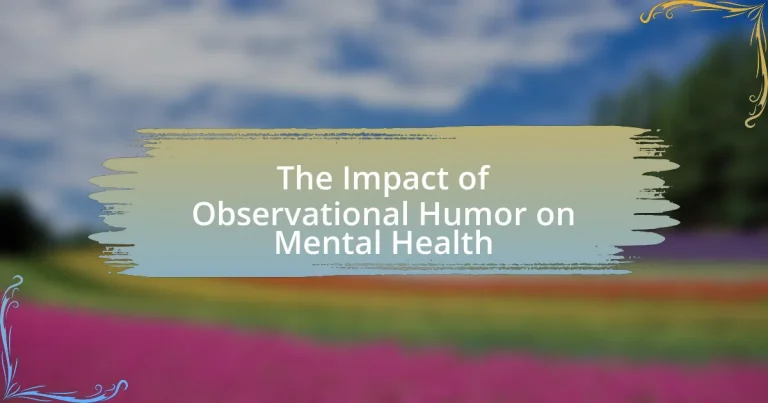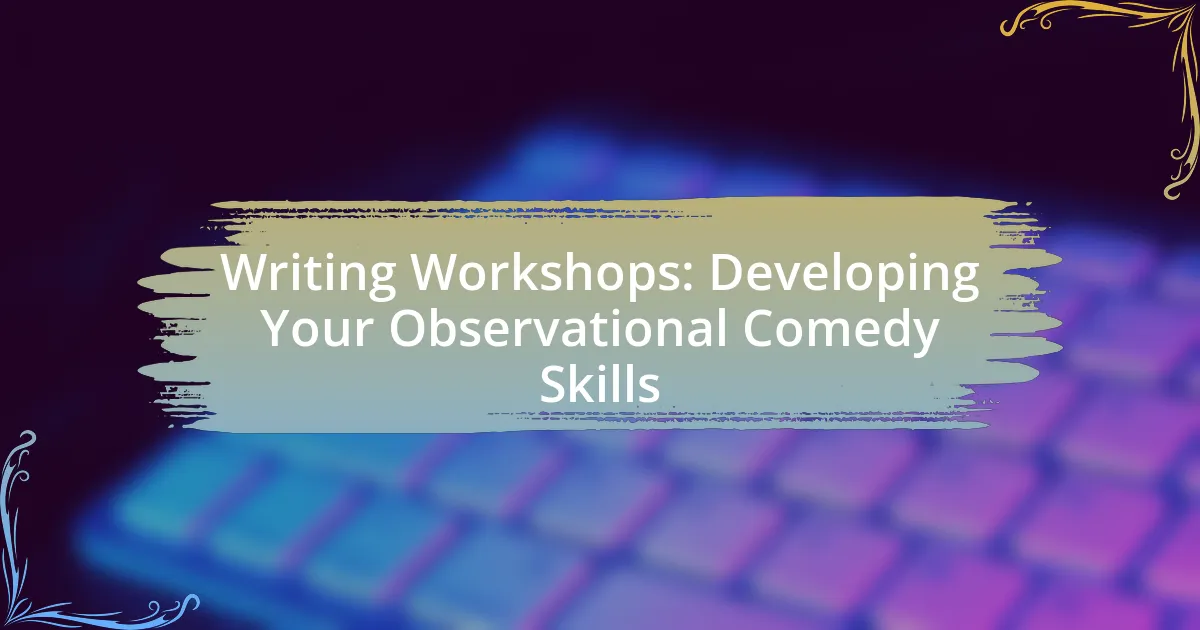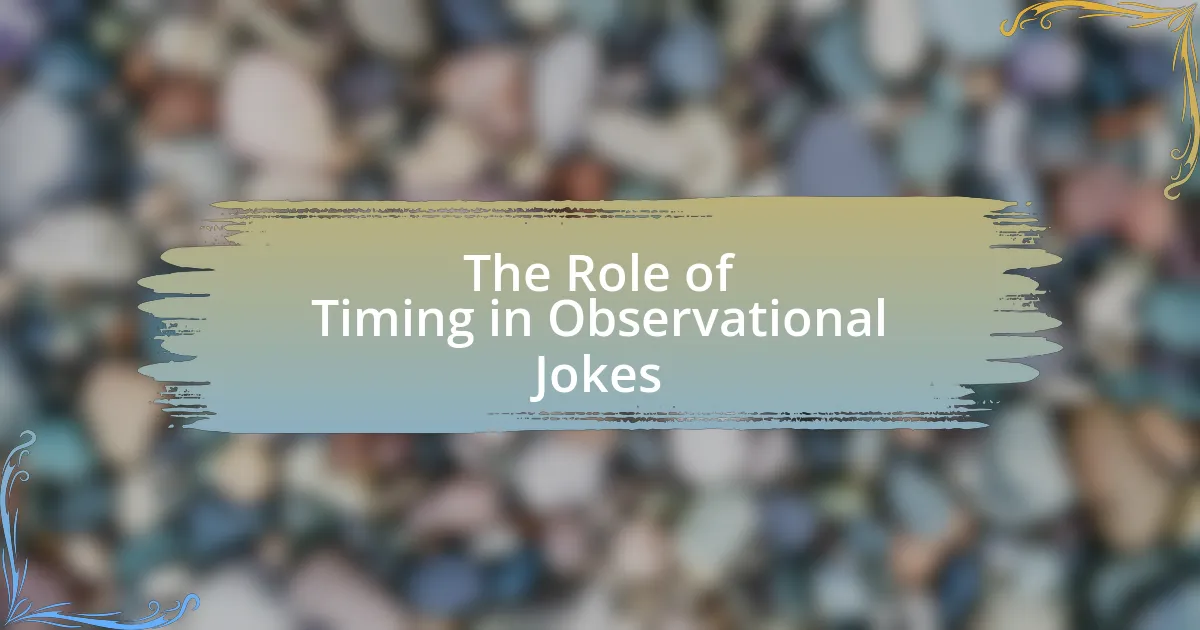The article examines the impact of observational humor on mental health, highlighting its positive effects on emotional well-being, social connections, and stress relief. It discusses how laughter, triggered by observational humor, promotes the release of endorphins, enhancing mood and reducing anxiety and depression. The article also explores the psychological mechanisms involved, the social benefits of humor, and the various types of observational humor, including self-deprecating and situational humor. Additionally, it addresses the limitations of humor as a coping strategy and provides strategies for effectively incorporating observational humor into daily life for improved mental health outcomes.
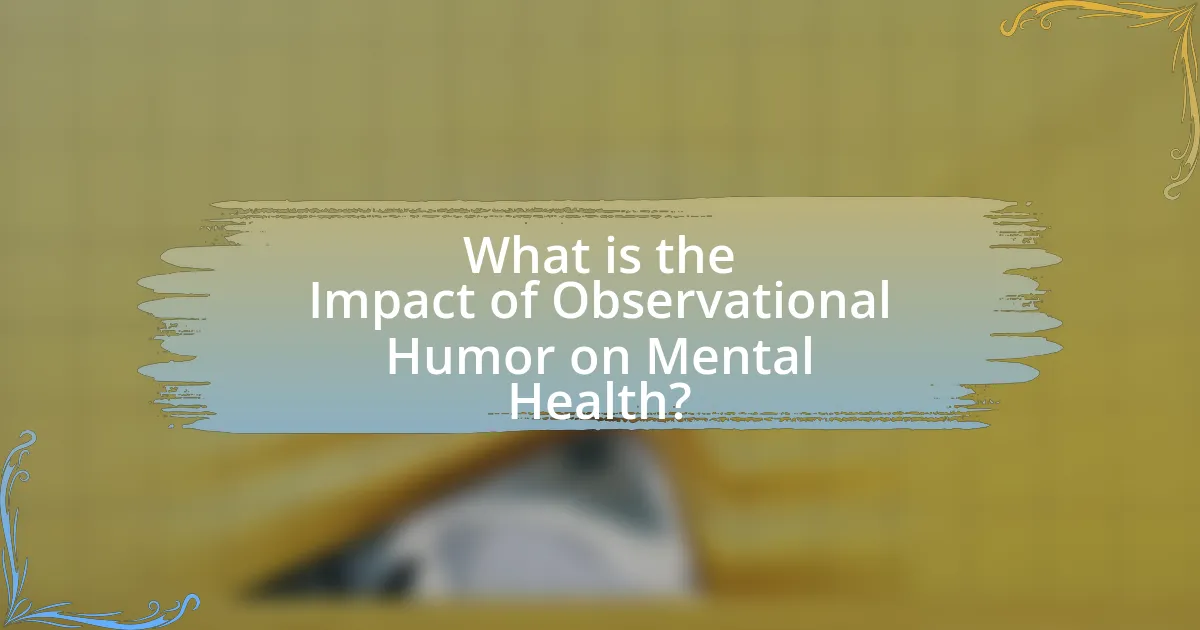
What is the Impact of Observational Humor on Mental Health?
Observational humor positively impacts mental health by promoting social connection and reducing stress. Research indicates that laughter, often elicited by observational humor, triggers the release of endorphins, which enhance mood and foster a sense of well-being. A study published in the journal “Psychological Science” found that individuals who engage in humor, particularly observational humor, report lower levels of anxiety and depression. This type of humor allows individuals to relate to shared experiences, creating a sense of community and belonging, which further supports mental health.
How does observational humor influence emotional well-being?
Observational humor positively influences emotional well-being by promoting laughter and reducing stress. Laughter triggers the release of endorphins, which are natural mood lifters, and can lead to a decrease in cortisol levels, the hormone associated with stress. Research indicates that individuals who engage with observational humor report higher levels of happiness and lower levels of anxiety. A study published in the journal “Psychological Science” found that humor can enhance social connections, which are crucial for emotional support and resilience. Thus, observational humor serves as a valuable tool for improving emotional health by fostering joy and social bonds.
What psychological mechanisms are involved in the effects of observational humor?
Observational humor primarily engages cognitive mechanisms such as recognition, social comparison, and emotional regulation. Recognition occurs when individuals identify with the humor, leading to a shared understanding of everyday experiences. Social comparison allows individuals to evaluate their own situations against those depicted in the humor, often resulting in feelings of relief or validation. Emotional regulation is facilitated as humor can diffuse tension and promote positive emotions, contributing to overall mental well-being. Research indicates that humor activates brain regions associated with reward and pleasure, reinforcing its psychological benefits.
How does observational humor relate to stress relief?
Observational humor significantly contributes to stress relief by allowing individuals to recognize and laugh at the absurdities of everyday life. This type of humor fosters a sense of connection and shared experience, which can alleviate feelings of isolation and anxiety. Research indicates that laughter triggers the release of endorphins, the body’s natural feel-good chemicals, which can enhance mood and reduce stress levels. A study published in the journal “Psychological Science” found that humor can serve as a coping mechanism, helping individuals manage stress more effectively by reframing negative situations in a lighter context.
What are the social benefits of observational humor for mental health?
Observational humor provides significant social benefits for mental health by fostering social connections and reducing stress. Engaging in observational humor allows individuals to share relatable experiences, which strengthens bonds and enhances feelings of belonging within social groups. Research indicates that laughter, often a result of humor, triggers the release of endorphins, promoting a sense of well-being and alleviating feelings of anxiety and depression. A study published in the journal “Psychological Science” by Robert Provine found that laughter is primarily a social phenomenon, reinforcing social ties and improving interpersonal relationships. Thus, observational humor not only serves as a coping mechanism but also enhances social interactions, contributing positively to mental health.
How does observational humor foster social connections?
Observational humor fosters social connections by creating shared experiences and facilitating bonding among individuals. This type of humor often highlights relatable situations, allowing people to find common ground and engage in laughter together, which strengthens interpersonal relationships. Research indicates that laughter triggers the release of endorphins, promoting feelings of happiness and reducing stress, thereby enhancing social interactions. Furthermore, studies show that groups who share humor are more cohesive and exhibit increased trust, leading to deeper connections among members.
What role does observational humor play in group dynamics?
Observational humor plays a significant role in group dynamics by fostering social cohesion and enhancing interpersonal relationships. This type of humor allows individuals to connect over shared experiences, creating a sense of belonging and reducing social barriers. Research indicates that groups that engage in humor are more likely to experience increased trust and collaboration, as humor can diffuse tension and promote a positive atmosphere. For instance, a study published in the Journal of Personality and Social Psychology found that groups that utilized humor during discussions reported higher levels of satisfaction and cooperation among members. Thus, observational humor serves as a vital tool in strengthening group dynamics and improving overall group functioning.
Why is observational humor considered a coping mechanism?
Observational humor is considered a coping mechanism because it allows individuals to process and make sense of their experiences through humor, reducing stress and anxiety. By highlighting the absurdities of everyday life, people can gain perspective on their challenges, which can lead to emotional relief. Research indicates that humor activates the brain’s reward system, releasing endorphins that promote feelings of happiness and relaxation. This psychological response can help individuals manage difficult situations more effectively, as evidenced by studies showing that laughter can lower cortisol levels, a hormone associated with stress.
How can observational humor help individuals deal with anxiety and depression?
Observational humor can help individuals deal with anxiety and depression by providing a mechanism for coping through laughter and perspective shift. This type of humor often highlights the absurdities of everyday life, allowing individuals to view their own struggles in a less serious light, which can reduce feelings of isolation and hopelessness. Research indicates that laughter triggers the release of endorphins, the body’s natural feel-good chemicals, which can alleviate symptoms of anxiety and depression. For instance, a study published in the Journal of Humor Research found that humor can significantly lower stress levels and improve mood, demonstrating its effectiveness as a therapeutic tool.
What are the limitations of using observational humor as a coping strategy?
Using observational humor as a coping strategy has several limitations, primarily its potential to trivialize serious issues. While humor can provide temporary relief, it may prevent individuals from addressing underlying emotional problems, leading to unresolved feelings. Additionally, observational humor often relies on shared experiences, which may not resonate with everyone, potentially alienating those who do not relate to the humor. This can create a barrier to effective communication and support among individuals facing similar challenges. Furthermore, excessive reliance on humor can mask deeper psychological distress, delaying necessary interventions or professional help.
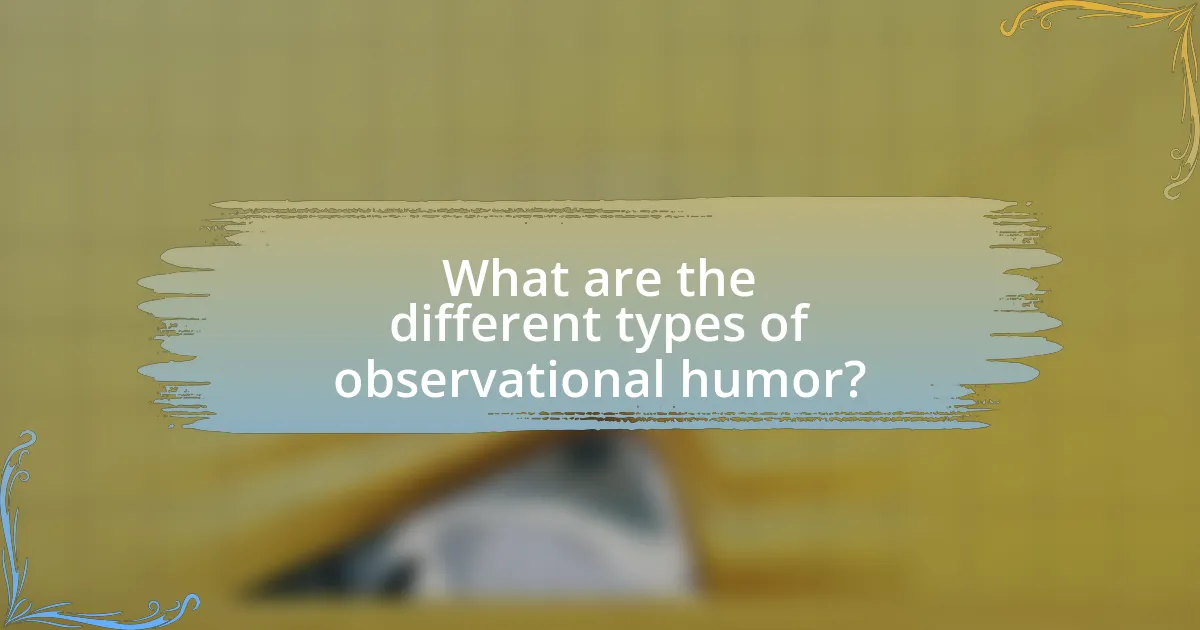
What are the different types of observational humor?
Observational humor can be categorized into several types, including social commentary, everyday life observations, and self-deprecating humor. Social commentary involves humor that critiques societal norms and behaviors, often highlighting absurdities in social interactions. Everyday life observations focus on the mundane aspects of daily routines, making relatable jokes about common experiences, such as commuting or family dynamics. Self-deprecating humor allows individuals to poke fun at their own flaws or situations, creating a connection with the audience through shared vulnerabilities. Each type serves to engage audiences by reflecting their own experiences and perceptions, thereby enhancing the therapeutic effects of humor on mental health.
How do various styles of observational humor affect mental health differently?
Various styles of observational humor can affect mental health differently by influencing emotional well-being, social connections, and coping mechanisms. For instance, self-deprecating humor may enhance resilience and promote a positive self-image, as it allows individuals to laugh at their own flaws, fostering acceptance and reducing anxiety. In contrast, sarcastic or cynical humor can lead to social alienation and reinforce negative thought patterns, potentially exacerbating feelings of depression or isolation. Research indicates that humor, particularly when it is inclusive and light-hearted, can serve as a protective factor against stress and improve overall mental health by enhancing social bonds and providing a coping strategy during challenging times.
What distinguishes self-deprecating humor from other forms?
Self-deprecating humor is distinguished from other forms of humor by its focus on the individual’s own flaws, mistakes, or shortcomings, often used to elicit laughter while simultaneously expressing vulnerability. Unlike other humor types that may target external subjects or societal norms, self-deprecating humor centers on the self, allowing individuals to connect with others through shared experiences of imperfection. Research indicates that this form of humor can enhance social bonds and improve mental health by fostering a sense of relatability and reducing social anxiety, as evidenced by studies showing that individuals who engage in self-deprecating humor often report feeling more accepted and less isolated.
How does situational humor impact mental health outcomes?
Situational humor positively impacts mental health outcomes by reducing stress and enhancing mood. Research indicates that laughter triggers the release of endorphins, which are natural mood lifters, and can decrease levels of stress hormones like cortisol. A study published in the journal “Psychological Science” by Martin et al. (2003) found that individuals exposed to humorous situations reported lower anxiety levels and improved overall well-being. Additionally, situational humor fosters social connections, which are crucial for mental health, as strong social support is linked to lower rates of depression and anxiety.
What are the cultural influences on observational humor?
Cultural influences on observational humor are shaped by societal norms, values, and shared experiences. Different cultures provide unique contexts that inform what is considered humorous, as humor often reflects the everyday realities and challenges faced by individuals within those societies. For instance, in Western cultures, observational humor frequently highlights individualism and personal anecdotes, while in collectivist cultures, humor may focus on community dynamics and social harmony. Research indicates that humor can serve as a coping mechanism, with cultural context influencing the types of humor that resonate with audiences, as seen in studies like “Cultural Differences in Humor: A Review” by Robert R. Provine, which emphasizes how cultural backgrounds affect humor appreciation and expression.
How does cultural context shape the perception of observational humor?
Cultural context significantly shapes the perception of observational humor by influencing the themes, references, and social norms that resonate with audiences. Different cultures have unique values, traditions, and experiences that inform what is considered funny; for instance, humor that relies on specific cultural references may be well-received in one culture but completely misunderstood in another. Research indicates that humor is often tied to shared experiences and social cohesion, meaning that observational humor that reflects the daily lives and challenges of a particular culture can foster connection and understanding among its members. This cultural specificity can be seen in the works of comedians like Ali Wong, who uses her Asian-American background to create relatable humor, highlighting how cultural context can enhance or limit the effectiveness of observational humor.
What role does cultural identity play in the effectiveness of observational humor?
Cultural identity significantly influences the effectiveness of observational humor by shaping the context and relatability of the humor presented. Observational humor often relies on shared experiences and cultural references, making it more impactful when the audience identifies with the cultural background of the comedian. For instance, research indicates that humor that resonates with specific cultural norms and values can enhance audience engagement and laughter, as seen in studies like “Cultural Differences in Humor: A Review” by Martin et al., which highlights how cultural context affects humor appreciation. Therefore, the alignment between a comedian’s cultural identity and the audience’s cultural background can enhance the humor’s effectiveness, leading to improved mental health outcomes through increased social bonding and stress relief.
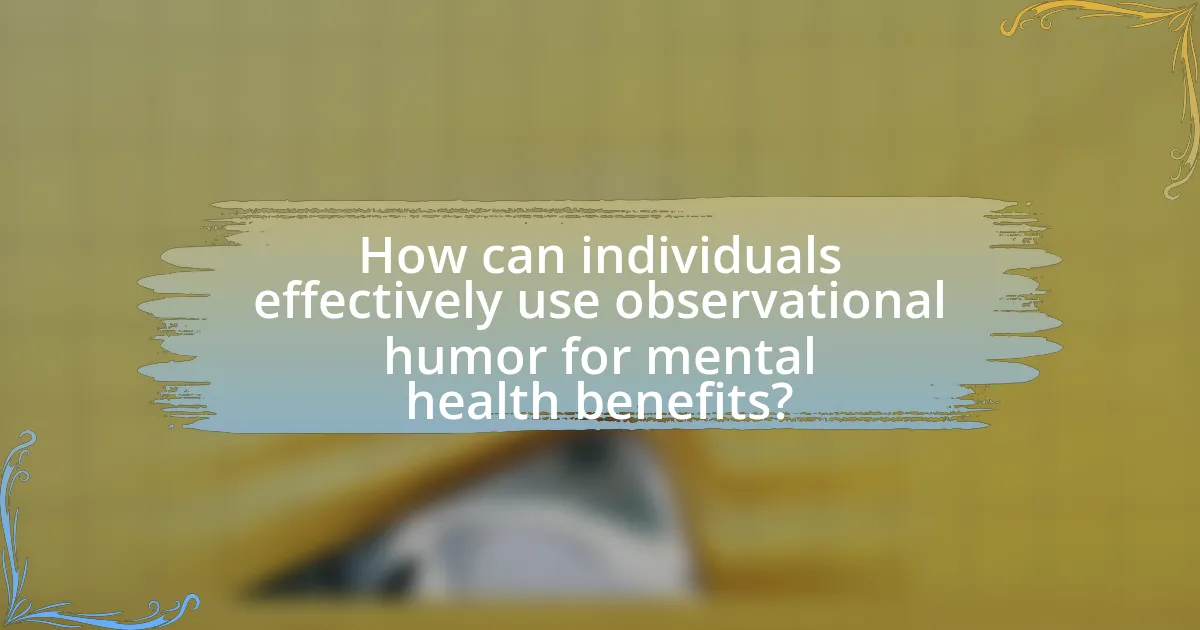
How can individuals effectively use observational humor for mental health benefits?
Individuals can effectively use observational humor for mental health benefits by actively engaging in the practice of identifying and sharing relatable, everyday experiences that evoke laughter. This approach fosters a sense of connection and community, which is crucial for emotional well-being. Research indicates that laughter triggers the release of endorphins, the body’s natural feel-good chemicals, promoting an overall sense of happiness and reducing stress levels. For instance, a study published in the journal “Psychological Science” found that humor can enhance mood and improve resilience in the face of challenges. By incorporating observational humor into daily interactions, individuals can create a positive atmosphere that supports mental health and encourages coping strategies during difficult times.
What strategies can enhance the positive effects of observational humor?
To enhance the positive effects of observational humor, individuals can employ strategies such as actively seeking relatable experiences, practicing timing and delivery, and fostering an open-minded environment. Actively seeking relatable experiences allows individuals to connect humor to shared life situations, which increases relatability and engagement. Practicing timing and delivery ensures that the humor is conveyed effectively, maximizing its impact on the audience. Fostering an open-minded environment encourages receptiveness to humor, which can lead to improved mental health outcomes, as studies indicate that humor can reduce stress and enhance social bonds.
How can individuals incorporate observational humor into their daily lives?
Individuals can incorporate observational humor into their daily lives by actively noticing and commenting on the mundane aspects of their surroundings and experiences. This practice involves paying attention to everyday situations, such as interactions with others, common frustrations, or peculiarities in social norms, and finding the humor in them. Research indicates that humor can enhance mental well-being by reducing stress and fostering social connections, as highlighted in a study published in the Journal of Humor Research, which found that individuals who engage in humor report higher levels of happiness and lower levels of anxiety. By sharing these humorous observations with friends or family, individuals can create a light-hearted atmosphere that promotes laughter and strengthens relationships, further contributing to improved mental health.
What are some best practices for sharing observational humor with others?
To effectively share observational humor with others, focus on relatability and timing. Relatable humor resonates with audiences because it reflects shared experiences, making it more impactful. Timing is crucial; delivering humor at the right moment enhances its effectiveness, as studies show that laughter can improve mood and foster social connections. Additionally, being mindful of the audience’s sensitivities ensures that the humor is well-received and does not offend. Research indicates that humor can reduce stress and promote mental well-being, reinforcing the importance of thoughtful delivery in social interactions.
What common pitfalls should be avoided when using observational humor?
Common pitfalls to avoid when using observational humor include relying on stereotypes, being overly negative, and lacking authenticity. Relying on stereotypes can alienate audiences and reinforce harmful biases, as studies show that humor based on stereotypes often leads to negative perceptions of marginalized groups. Being overly negative can create a pessimistic atmosphere, which may detract from the intended light-heartedness of the humor; research indicates that humor should uplift rather than bring down to maintain a positive mental health impact. Lastly, lacking authenticity can make the humor feel forced or insincere, which can disengage the audience; authenticity in humor fosters connection and relatability, essential for effective observational comedy.
How can misinterpretation of observational humor lead to negative outcomes?
Misinterpretation of observational humor can lead to negative outcomes by fostering misunderstandings and reinforcing stereotypes. When individuals misinterpret humor intended to highlight social norms or behaviors, they may take offense or feel marginalized, which can exacerbate feelings of anxiety or depression. For example, a study published in the Journal of Personality and Social Psychology found that humor that is perceived as derogatory can lead to increased social anxiety among those targeted, as they may feel judged or ridiculed. Additionally, misinterpretation can create divisions among groups, as humor that is meant to unify can instead alienate individuals who do not share the same perspective, further impacting mental health negatively.
What are the risks of relying solely on humor for mental health support?
Relying solely on humor for mental health support poses significant risks, including the potential for avoidance of deeper emotional issues and the minimization of serious mental health conditions. Humor can serve as a temporary coping mechanism, but it may prevent individuals from addressing underlying problems, leading to unresolved psychological distress. Research indicates that while humor can enhance mood and foster social connections, it does not replace the need for professional mental health interventions, particularly for conditions like depression and anxiety, which require comprehensive treatment strategies. Therefore, over-reliance on humor can result in a lack of necessary therapeutic engagement, ultimately exacerbating mental health challenges.
